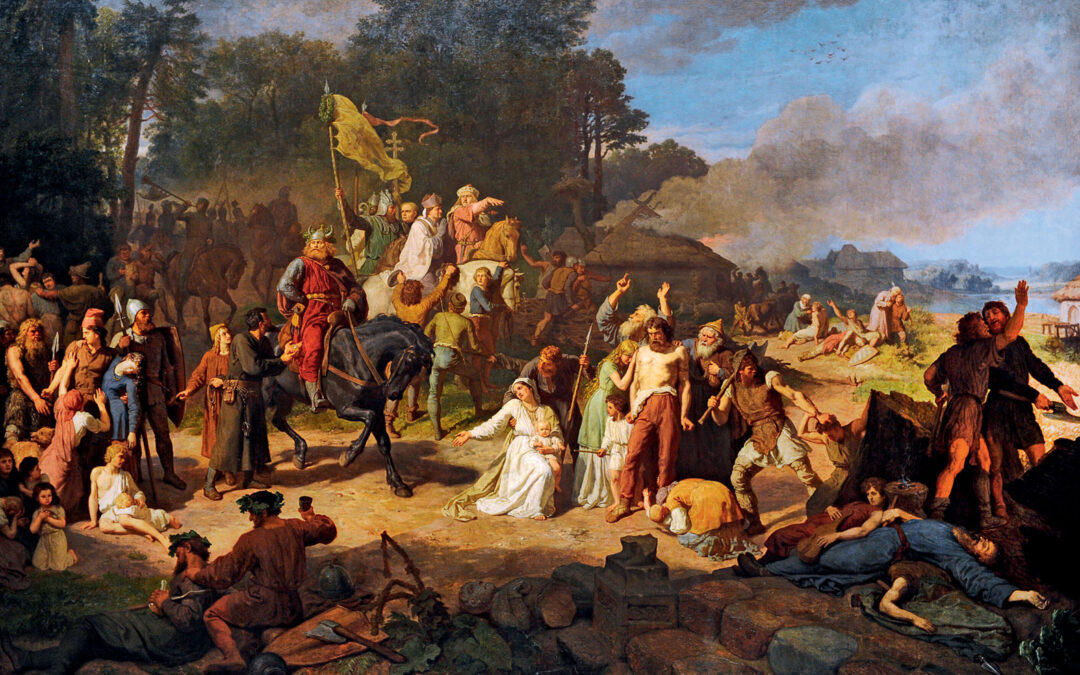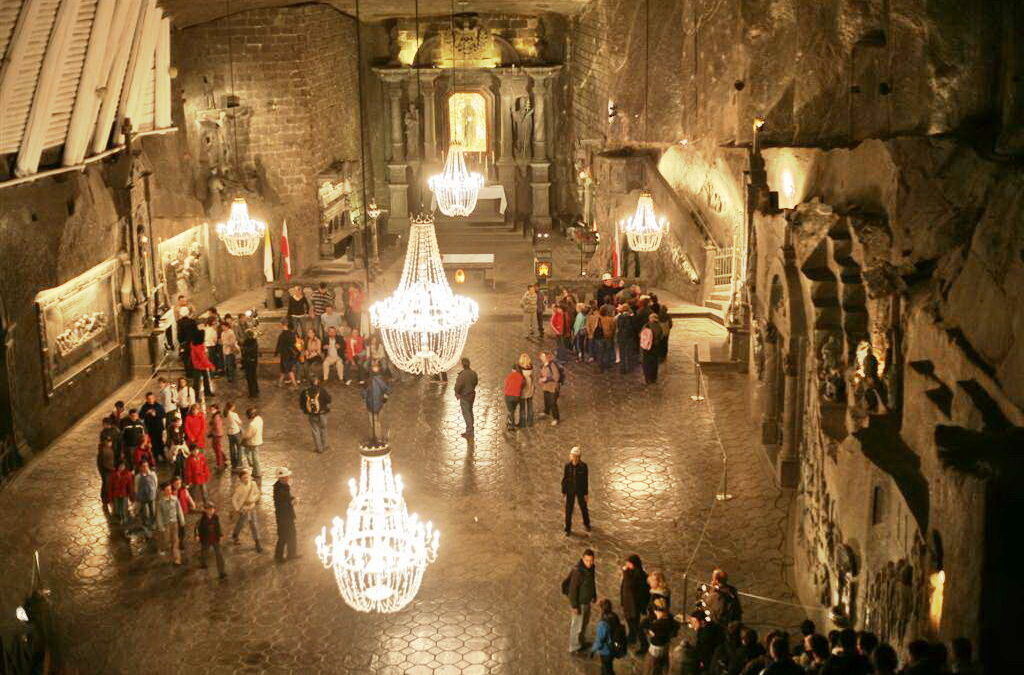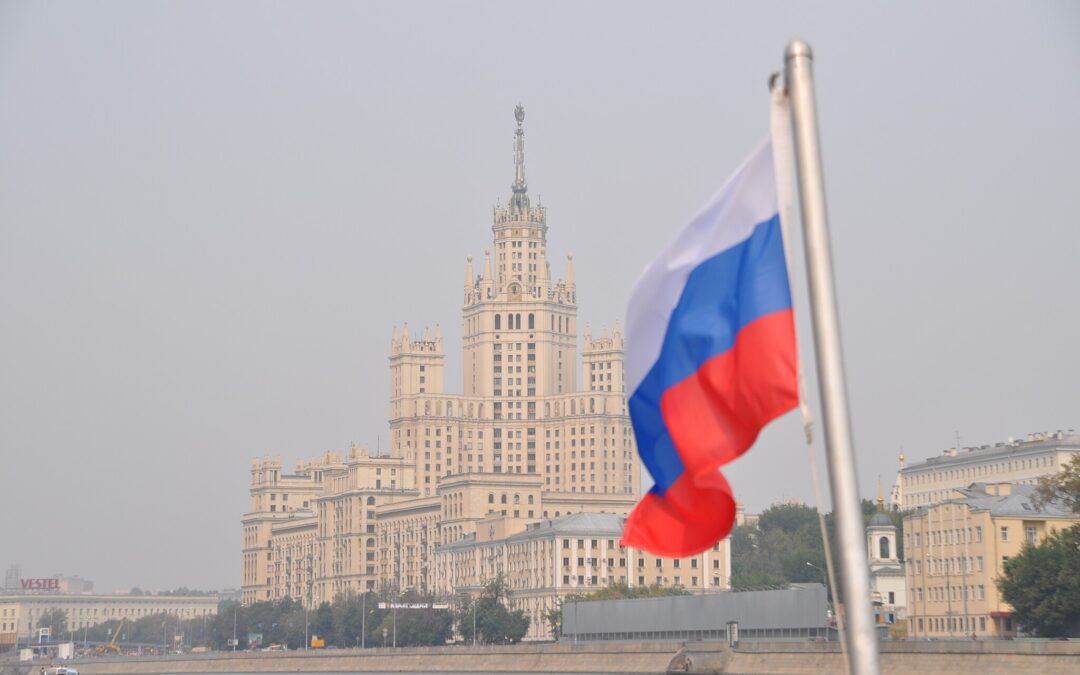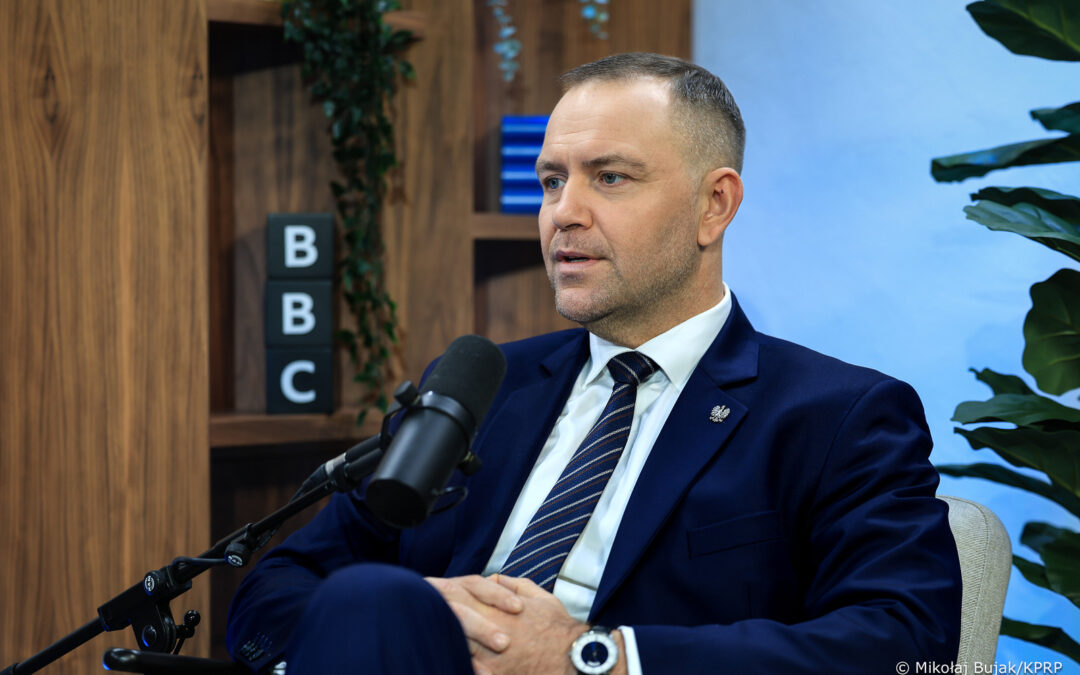The scholar, literary critic and renowned feminist Maria Janion died in August at the age of 93. Janion was an activist of the underground Polish Scouting Organisation in the Second World War, a member of the Polish United Workers’ Party after it, and later active in the democratic opposition. Her academic work challenged popular narratives and concepts of the place of Romanticism in Polish identity.
Janion’s best-known book, Uncanny Slavdom (Niesamowita Słowiańszczyzna), explores Slavic identity and seeks a place for Slavism in modern Europe, arguing that Poles today remain collectively traumatised a thousand years after Latin influence severed them from their pagan traditions.
In this article, published in cooperation with the Jagiellonian Club think tank, Daria Chibner offers a rereading, praising Janion’s courage but criticising some of her arguments, and concluding that Polishness remains a strong idea despite geographical contradictions.
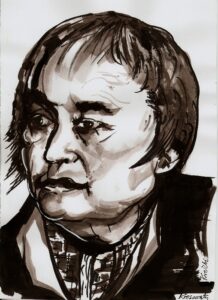
Portrait of Maria Janion by Zbigniew Kresowaty
A controversial and courageous scholar
The passing of Maria Janion, a scholar who was as controversial as she was remarkably courageous in her interpretations, should encourage us to ask further questions. After all, this is what the humanities are based on – taking an engaged interest in our perspective on the world without accepting everything uncritically, but constantly enquiring about fundamental issues.
From this point of view, Maria Janion’s works are an important element of the Polish intellectual landscape. Why is she worth reading? Not because wise old heads have deemed her to be an authority. The reason is much simpler – her works compel us to think and discuss. Moreover, like no one else, Janion managed to explore difficult subjects that were painful for people to hear.
She knew very well where our national sore points were and did not hesitate to strike them. She was not always right, but was always inspiring.
Maria Janion’s best-known and most read work is Uncanny Slavdom. Published in 2006, it has enjoyed a second wave of popularity as interest in the spiritual and material legacy of Slavic times has grown. Yet the Slavs are only a starting point for asking a much more crucial question – on the reason for the rupturing of Polish identity.
Lost pagan heritage
Janion casts Poland’s pagan past as a lost heritage. She seeks the past forgotten and lost by Poles using traces preserved in Romantic literature. Following the historian Aleksander Gieysztor, who used the new type of historical reflection where source analysis gradually gave way to interpretation, Janion weaves her own characteristic, humanities-based narrative. This is about examining meanings – how they were formed, how they influenced us and what they say about us.
A narrative in this sense has an entirely different dynamic from a standard interpretation. Not only does it form a specific vision of the subject, but we can also use it directly to refer to the present. Narratives are by nature teleological; their purpose is not to cheer listeners up. Their background is values and meanings that are undeniably current. They frequently help us to understand ourselves and our own unique situation.
And a humanities-based narrative also has other tools: theories associated with classical methods of analysis and therefore often seeming bizarre, awkward, inappropriate and lacking the right scientific form. All of this helps to find an answer to fundamental contemporary problems.
In Uncanny Slavdom, Maria Janion put Polish identity under the microscope. For her, the loss of the Slavic legacy led to an indelible rupture on our national soul. We experience a certain void that prevents us from finding our own place in modern Europe.
Denied an important chunk of our history, we are suspended between a sense of superiority over the Barbarian East and awareness of inferiority towards the cultural and technological might of the West. We are an incomplete entity without foundations and consequently lost and exposed to constant wounds.
The remedy would be to introduce Slavdom into the general consciousness, without fear of its uncanniness, mystery and menace. History would have to be retold to bring unity to the impaired collective existence. Janion does not see “Slavdom” as meaning a specific entity, but a phantasy. This Freudian term means something that we can regard as an imagined idea, illusion or myth, yet which remains inextricably linked to reality and takes its actual shape only in our internal life.
The absence of the Slavs in Polish consciousness is not a matter of simple historical ignorance. It is a wound that is hard to heal. The Christian religion, from which we usually begin our self-narrative, was something diametrically different from paganism. And adopting the new faith did not take place meekly and peacefully. We were cut off from our own imaginary and found ourselves in an alien world.
Badly baptised, denied our roots, we lost our dualism, and even today this results in helplessness regarding the pressing challenges of contemporary life. In a sense, we were no longer us, and today we continue to search for support in the eyes of others – as if we were unable to decide for ourselves.
Naturally, Maria Janion realised that regaining the lost heritage of Slavdom is impossible. Too much time has passed. Many sources are simply impossible to reach. Poles have an ambivalent attitude towards the Slavs.
On the one hand, they seem semi-mythical, savage, and unsuited to rational and objective thinking, while on the other, we have been taught that this heritage should not be treated seriously as it could conceal things that are shameful, and not worthy of imitation. Yet we can still look for traces (in literature, culture and history) of the lost duality, to understand which mechanisms ensured that we are still familiar with the sense of loss.
Fragmented identity
Uncanny Slavdom is divided in two. The separate parts of the book are meant to reflect a spiritual division or flaw. This structure is a symbol of a breakdown in identity lacking solid foundations. The early sections explore philosophical and literary subjects, touching upon the history of the Slavs, the Romantic reception of Slavdom and the history of paganism in the Polish lands.Janion also analyses the categories of menace and uncanniness that set the tone for her entire argument.
The second part focuses on more contemporary issues: the crisis of patriotism, the approach to feminism, Poland’s relations with its neighbours, as well as the unresolved trauma associated with Jews. Like the country itself, Uncanny Slavdom is fragmented.
The symbols and meanings that Poles ascribe to Poland are deceptive, incompatible and ambiguous. Our symbols have become allegories – they look nice during state ceremonies, but no longer mean anything. All of this begins with the equivocal status of Slavdom in our consciousness. Like Romanticism, it is at once forgotten and unforgotten. Forgotten as an existing reality to which we will never have access, and unforgotten as a concrete spirituality with a continued impact on the construction of Polish identity.
Its inherent uncanniness can continue thanks to later literary examples, but it remains latent. And it arouses terror in us. Our figures of the Mother, Father, woman and fatherland have only an external form – inside they are empty, powerless to make us act. We have lost the freedom to define ourselves. We have a hazy idea that somebody appropriated our heritage, but we do not know what it actually was.
Christianised Poles were denied the right to be Slavs. They currently reside in an abyss which they try to escape using two contradictory mentalities. On the one hand, we are characterised by our postcolonial mentality – we feel worse, poorer and more backward than the magnificent West, and call ourselves the peripheries. On the other hand, we are not averse to a messianic pride and sense of superiority over the Barbarian East. Our exceptional merits and suffering empower us to admonish the rotten West – we are the ones who are the stronghold of tradition and ancient values.
Running from East to West, we did not even trip up in the middle. In this limbo, we do not cope either with the painful pages of our history or the values professed by liberal Europe.
Maria Janion employed methods from diverse concepts in the humanities in her work. She was no stranger to postcolonialism and feminist theory as well as psychoanalysis. She endeavoured to reach further to places less accessible to scholars whose gaze stopped at the classic sources of the era. Unfortunately, this did not always lead her to the right conclusions. She tried to replace one grand narrative with another story focused on the Slavic context, but frequently manipulated examples to fit her vision.
In the foreground is Poles’ supposed peripherality and messianic megalomania. As if the history of Poland were limited to a few medieval moments and the nineteenth century. The existence of the Polish renaissance, with its examples disproving our inferior and imitative nature, was omitted. It would be hard to argue that in those days too we were alien to ourselves. Yet such an inclusion would undermine the composition of the narrative.
Contradictions and incoherence
Uncanny Slavdom was an attempt to tell a slightly different story in which the change in the dominant paradigm takes place by recapturing a lost, pagan heritage. Yet this all falls apart as a result of methodological contradictions. Janion mixes classical research methods with more contemporary ones. Moreover, she even treats modern theories rather blithely, taking those that happen to confirm her arguments.
But it is by no means easy to combine the elements of various theories into one coherent whole. This must also be reconciled with classical reflections and a narrative form with a set framework, rules, meanings, and above all coherence. The method of doing humanities Janion proposes is fundamentally impossible to achieve. You cannot reduce all fundamental differences to one interpretation. One sticking point is her liberal application of postcolonial theory, which retains only loose links to Edward Said’s arguments.
Furthermore, some passages in the book (especially those concerning the Jewish question) break off from the main argument. They serve solely to mark the author’s personal political preferences. In her narrative about Slavdom, she does not cover up divisions, but only distributes her own and those of others differently.
Ultimately, Maria Janion herself proved to be the most divided. She was torn between her great love for Romantic literature, also confirmed by vast knowledge in this area, and interpretations of this period through a specific worldview for which the main point of reference was socio-political objectives.
Uncanny Slavdom is therefore a collection of convictions that were not always harmonious. Janion was alien to herself – stretched between classical methods of research and use of concepts that clearly challenged their rightness. A narrative woven from such threads simply cannot succeed.
Imagined geography
In some respects, Maria Janion managed to break free from a remarkably popular geographical paradigm whose beginnings stretch back to the Enlightenment – one that continues to inspire many authors who wish to locate Polishness in one specific place.
For the literary critic Przemysław Czapliński, Poland lies where it always did, suspended between various directions. It is unable to integrate with anyone satisfactorily, and the Poles themselves, rather than real spaces, prefer imagined worlds.
Meanwhile, in his book North and South, the philosopher Marek Cichocki challenges the traditional division into West and East. After all, Poles were Barbarians from the North converted by Southern Christianity. This is an interesting proposal, although this North is nothing – Cichocki neither reflects on it nor treats it seriously. It resembles an empty jug that could gain contents only after travelling south.
Although these are only two examples, such imagined geography continues to produce new senses. It generates beautiful meanings that are practically useless. I would dearly love to see an adequate definition of the recently less popular term East-Central Europe. And yet it is difficult to discard, for is it possible to talk about oneself without indicating the place?
Maria Janion noticed that discussion on identity takes place in the internal rather than the external space. Although she used geographical terms, she was aware of the uncertainty of these categories. Yet she did not tackle this issue. It is worth considering whether imagined geography can tell us something significant about our spirituality.
Perhaps Poland really is nowhere? “Nowhere” is a terrible word. It is associated with deficit, absence, negation and denial. Somebody whose identity has no place is a troublemaker and opportunist with no roots or regard for history and tradition. Identity not rooted in the soil arouses fear and uncertainty, is hard to define and difficult to know what to do with – it is generally misunderstood. And yet it is this absence of place that is the best definition of Polishness.
Poles are not tied to a place, but to identity itself as a kind of spiritual entity. We do not ask where we are from, but who we are. We are constantly ruminating on ourselves. We must reflect, challenge and incessantly ask about identity, as this is how we form ourselves.
If we are to look at ourselves through an outside, geographical paradigm not created for us, all we will ever see are bizarre eccentrics. In the debate on Poland’s place on the imagined map of the world, it is therefore worth following Paweł Rojek’s intuition. Poland lies nowhere, it is a universal idea.
In reality, we simply form identity in a different, unique way. We use concepts, disputes and discussions, and not land and place. Geographically, we will always be fighting a losing battle. Whether we put ourselves on the East–West or the North–South axis, we will never find ourselves in the right place. There will always be something missing.
The problem might also lie with those who are unable to look at us other than by insistently clinging to categories that came about when we were viewed as representatives of a ridiculous and peripheral country.
It is better to recall the renaissance tone, in which one could hear not resentment and a sense of injustice, but pride at the fact that we can turn everything to our own good. We fearlessly modified many ancient models, and literature encouraged our authentic being. Nobody thought of looking around at others. We still believed that being ourselves, even despite widespread criticism, is a great value.
I know that the poet Maria Konopnicka wrote Rota [“The Oath”, an early twentieth-century poem that protested against the German Empire’s polices of forced Germanisation of Poles], and in some regions the influence of the German category of Heimat is incontrovertible. We can, of course, find in sources examples of strong ties to our native land, but in these too we hear peculiar questions about the state of the Polish spirit formed in different circumstances than those that created Western thinking.
Yet without a strong spiritual identity we would not have been able to introduce to European ideas the conviction of the possibility of a nation existing without a state. And we would have been unlikely to survive the Partitions and other historical calamities. Probably we are not alien to ourselves, but we do not meet with adequate understanding and have lost the conviction that our duality is something worth preserving and cultivating.
Sometimes it is worth being nowhere, while remaining oneself.
The original version of this article can be found here. Translated by Ben Koschalka.
Main image credit: Opłakane apostolstwo/Wojciech Gerson (under public domain)
